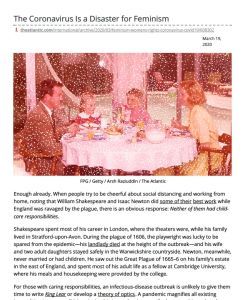Writing in The Atlantic, Helen Lewis details the ways that women face outsized consequences in a pandemic and what governments could do about it. As she notes, William Shakespeare wrote King Lear and Isaac Newton’s work flourished during the Great Plague of London, but they weren’t sheltering in place with children. Lewis offers telling anecdotal and statistical evidence that during the coronavirus pandemic women are likely to shoulder the lion’s share of child care and domestic work and are more likely to lose or give up their jobs, all while governments pay scant attention to their thoughts or needs.
COVID-19 makes men physically sicker than women, but pandemics damage women in other ways.
When the kids are home, when the elderly are isolated, when sick people require care and when the whole family needs supplies, women bear the brunt of providing unpaid labor. This holds true in developed and undeveloped nations.
The Ebola outbreak provided a compelling example. Most West Africans suffered financially, but men’s income levels recovered more quickly afterward than women’s. Experts fear the same is likely to be true for COVID-19. This is a health catastrophe and an economic one, as well. Economic disaster brings stark cultural change; couples may find that the coronavirus transports them “back to the 1950s.”
Dual-income couples enjoyed the advantages of outsourcing child care, but social-distancing measures upset that balance.
As schools and day care centers closed to comply with social distancing measures, child care shifted from the realm of paid workers to the unpaid realm of the home. Two-job couples previously had the luxury of paying child care workers. No more. Families must take...


















Comment on this summary